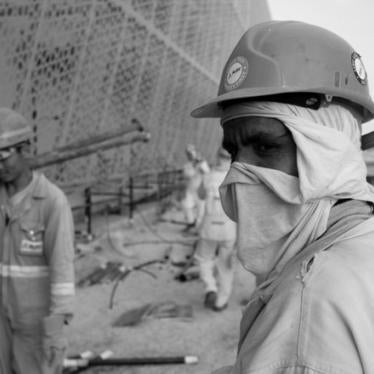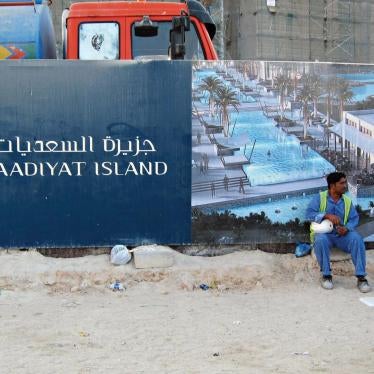The government-owned developer of Abu Dhabi’s high-profile Saadiyat Island project, the Tourism Development and Investment Company (TDIC), faces “significant challenges” to carry out agreed-upon minimum labor standards, says the September 23, 2012 report published by independent auditing firm PricewaterhouseCoopers (PwC). Saadiyat Island will be home to branches of the Louvre and Guggenheim Museums and a New York University (NYU) campus, and has been the focus of criticism over migrant workers’ rights.
“The concerns raised in this report by the independent monitor it appointed should serve as a wake-up call to the UAE tourism agency and government, and should alarm the cultural and educational institutions involved with the island project,” said Joe Stork, deputy Middle East director at Human Rights Watch. “In an area where exploitation has been widespread, codes of conduct are not substitutes for good laws and meaningful enforcement.”
PwC interviewed 1,341 workers between June 2011 and May 2012 to assess the developer’s compliance with the Employment Practices Policy (EPP), a code the developer drew up in 2009 that was primarily based on UAE labor law.
The 34-page report detailed a range of ongoing violations of the EPP and domestic labor law. It says that 75 percent of workers interviewed had paid recruitment fees and 77 percent had paid visa and travel costs, which are supposed to be paid by employers. According to Human Rights Watch’s research, these recruitment fees are the most significant factor in creating conditions of forced labor in the UAE. Twenty percent of those interviewed reported illegal deductions from their salaries.
In terms of living conditions for workers, PwC found that 45 percent of those interviewed did not live in the much-vaunted Saadiyat Construction Village built for the workers, but in alternative accommodation. And it verified worker complaints about poor sanitation conditions and faulty air conditioning at the Construction Village housing, which the tourism agency’s website describes as a “model of best practice.”
It said there is a need to clarify what constitutes appropriate drinking water in summer months and the definition of “adequate sanitation facilities.” It also said that the developer did not provide transport to nearby Abu Dhabi for workers on their only weekly day off. PwC said of the developer that, “TDIC faces significant challenges in implementing the EPP, operating against the backdrop of a complex construction sector in the Middle East Region with established practices and norms that are not necessarily all aligned with the EPP requirements.”
The PwC report also revealed that two contractors had been offered financial incentives to comply with the terms of the Employment Practice Policy.
In January 2011, United Kingdom construction firm Mott McDonald, hired as monitors by NYU, had released their compliance report, concluding that there was “wide ranging evidence” that NYU was “taking workers’ rights seriously”. PwC, for their part, noted significant improvement in some areas, including a strong health and safety record. It also found that 97 percent of workers interviewed were in possession of their passports, a change from the past in which employers routinely confiscated passports, making it harder for workers to change employment or complain about abuse.
But it offered a frank assessment of the complicated system of transnational recruitment, which affects all migrant workers in the UAE. It said that contractors acknowledged that they recruit foreign workers through UAE-based recruitment agencies, which in turn recruit workers through a network of agencies in the workers’ home countries and their representatives in various cities and towns. PwC said that the practice of passing agent fees and travel and visa costs on to workers was “a key issue that needs to be addressed.”
In March, Human Rights Watch released a follow-up report to its 2009 report on conditions on Saadiyat (“Happiness”) Island. It reported “the continued prevalence of workers reporting the payment of recruiting fees” in violation of UAE labor law. In line with the terms of the Employment Practices Policy, Human Rights Watch said the developer should make an “unequivocal promise to ensure that workers are reimbursed any recruiting fees they are found to have paid to secure employment on the island.”
In March 24, 2011, the developer had responded to the initial findings of a follow-up Human Rights Watch report, asserting that 13,969 out of 15,354 workers had signed its Site Assignment Agreement, in which they declared that they had not paid recruitment fees. The developer said it was still processing the remainder of the workers’ declarations and questioned the Human Rights Watch finding. But the PwC report casts doubt on the developer’s claims that workers were not paying recruitment fees.
Sultan Al Mahmoud, the developer’s executive director of strategic performance and chairman of the company’s Corporate Social Responsibility Committee, said on September 23, 2012, that the PwC report demonstrated that “improvement on various levels related to working and living conditions have been achieved and sustained” but did not acknowledge that the report also exposed systemic flaws in the UAE’s labor system.
The PwC report underscores the urgent need for reform of the UAE’s legal and regulatory framework, which facilitates the abuse of the country’s four million migrant workers, Human Rights Watch said. Migrant workers who do not work on high-profile projects do not benefit from the scrutiny of independent monitoring by reputable firms of their living and working conditions, Human Rights Watch said.
The UAE prohibits trade unions. Migrant workers are subject to the exploitative potential of the kafala system of sponsorship-based employment, which makes it harder for a worker to leave an abusive employer, and they face severe difficulties in accessing the justice system, Human Rights Watch said.
“It is high time for the UAE’s rulers to ensure that everyone who works in the country is protected from abuse,” Stork said. “Until the UAE is capable of enforcing its laws to protect workers, foreign institutions need to exercise extreme caution so they don’t become implicated in projects that violate international minimum labor and human rights standards.”








